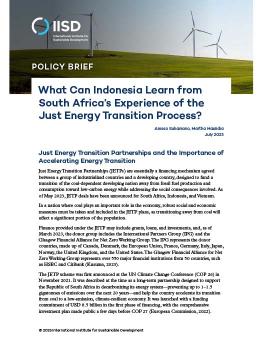
What Can Indonesia Learn from South Africa's Experience of the Just Energy Transition Process?
Indonesia is currently in the process of preparing its comprehensive investment plan as part of the Just Energy Transition Partnership (JETP). This brief assesses the JETP process South Africa went through one year after it was announced to highlight any relevant findings and lessons to assist policy-makers implementing the Indonesian JETP.
Just Energy Transition Partnerships (JETPs) are a financing mechanism agreed between a group of industrialized countries and a developing country.
The second JETP deal was announced during the G20 Summit in November 2022. The IPG—led by the United States and Japan—pledged to mobilize USD 20 billion (around IDR 300 trillion) over the next 3–5 years to accelerate Indonesia’s energy transition through early retirement of coal power plants and deployment of renewable energy. The deal appears to herald a dramatic shift in energy policy, setting a new target for renewables—which will need to account for 34% of the country’s power production by 2030.
Having reviewed the experience of South Africa's JETP this brief recommends that Indonesia:
- Select Projects to Be Included in the JETP IP Carefully and Be Able to Demonstrate Results
- Agree on a Strong Energy Policy That Binds the Power Sector in Indonesia to the Coal Phase-Out Plan as Laid Out in the JETP IP
- Focus Clearly on the Social Impacts of JETP
- Seize the Opportunity of the JETP IP and Use Public Funds to Leverage Private Investment
- Mitigate Risk and Ensure Smooth Implementation of the JETP by Prioritizing the Achievement of a Broad Consensus Across Government
- Translate the Commitment to JETP Into Legislation
Participating experts
You might also be interested in
How Indonesia's Incoming President Can Advance the Transition to Clean Energy
With Prabowo Subianto inaugurated as Indonesia’s President, speculation abounds about the new administration’s commitment to the clean energy transition and climate targets, given Prabowo’s positioning as the “continuity candidate.” The question is, what, exactly, will be continued?
Unlocking Clean Power for All
This report uses tipping point theory to advise where public funding can be strategically directed to catalyze renewable energy deployment in developing and emerging economies.
Public Financial Support for Renewable Power Generation and Integration in the G20 Countries
G20 governments provided at least USD 168 billion in public financial support for renewable power in 2023, less than one third of G20 fossil fuel subsidies that year.
Senegal’s LNG Drive Is an Economic Gamble
Senegal’s plan to drive economic growth through exports of LNG—largely to Europe—is a gamble, new research warns, as forecasts indicate an imminent decline in international demand for gas.